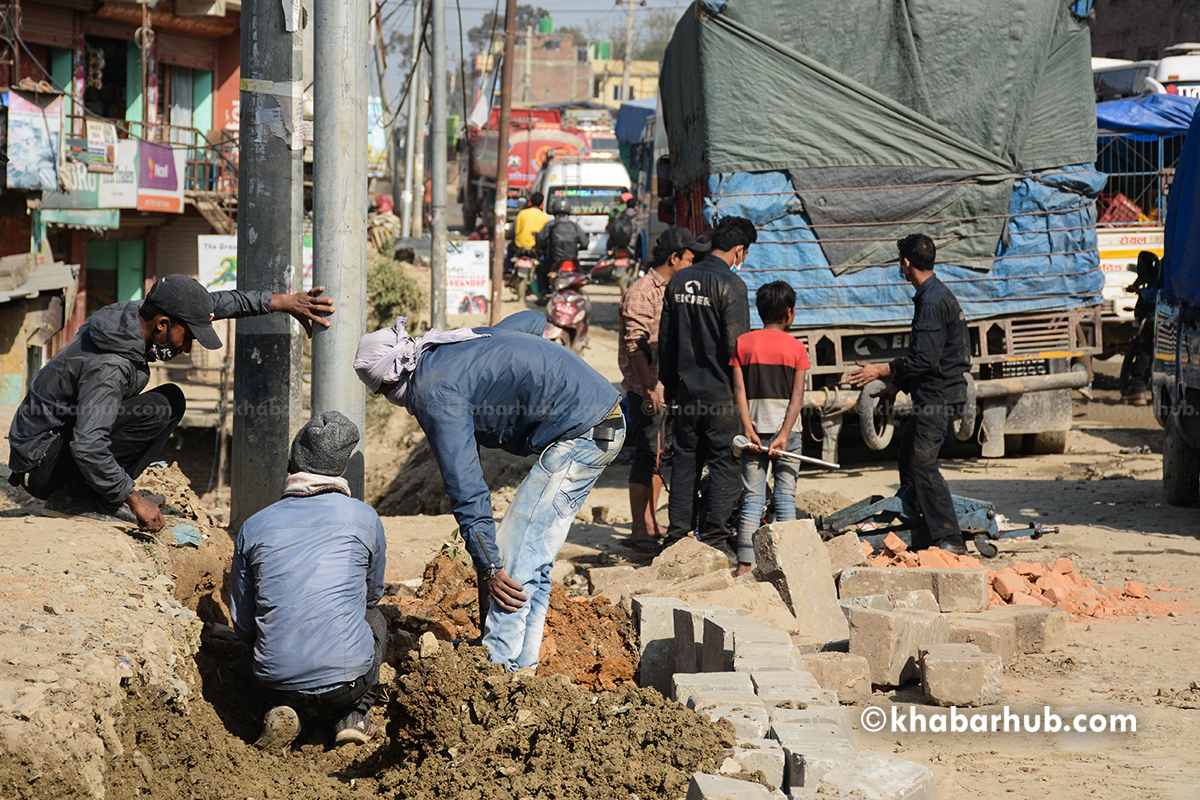KATHMANDU: Over 4.4 million people working in an informal sector in the country are facing different vulnerabilities.
According to the report “Under the Shadows of Informality: A Vulnerability Assessment of Informal Sector Workers of Nepal” asserted by the Centre for Social Change, workers in the informal sectors are disproportionately vulnerable as compared to formal sector workers.

About 1.5 million workers are informally employed. The report shows a growing involvement of women (66.5%) in informal employment in Nepal.
However, women are reported to be devoid of minimum wages, decent working conditions, and any kind of social protection coverage as compared to 59.7% of male informal workers.
Informal workers have been facing economic, occupational and social, and political vulnerabilities.
The majority of the informal workers interviewed report that their income barely covered basic necessities and does not leave much for future savings.
“There is no sense of savings for us. We earn today. We eat today. Many times, only one member earns in the family who faces a great deal of pressure to manage day-to-day expenses. Forget about savings.”- Female construction worker said, the report quoted.
The study derives that low familiarity and access to measures of banking systems majorly drive informal workers to use unreliable methods of savings.
“I was only starting to pay off previous loans I had taken from my contractor when Covid-19 hit. The first lockdown restrictions made life difficult for me, my wife, and three kids. The loan that I took was barely enough for food and rent. Now, the second lockdown has brought more money problems. It’s like I can never come out of this debt cycle,” the report quoted a male construction worker.
However, the government of Nepal has ensured a minimum wage of NRs.15,000, an increment from the previously set number of NRs.13,450.12 The recently reformed Labour Act (2017) and Social Security Act (2018) have also taken strides in ensuring the welfare and wellbeing of both workers and employers.
However, these reforms target workers in the formal sector and have made little to no impact on informal sector workers.

Informal sector workers often working with low and unstable pay, face greater risks of working in risky and hazardous conditions and occupational vulnerabilities than formal sector workers.
“I am very scared of working in tall buildings. I have a small baby. If I fall from a height and break my bones, I don’t know what will happen to my baby. I try to request upfront with employers or my workmates to give me tasks at ground levels,” a female construction worker said.
In addition, factors such as social stigma, extreme economic vulnerability, overall lack of awareness about relevant legal mechanisms, made more vulnerable to workplace violence and harassment.
“There are instances when male passengers insist on taking the front seat of the tempo and sit too close. There was one time when I had to call a female traffic officer to make a passenger step down from the vehicle. I just did not feel safe at that time,” a female Safa tempo driver has been quoted in the report.
The study suggests that discrimination and stigma against informal workers go beyond workplaces to societal hostility.
Mostly belonging to marginalized groups, informal workers were already subjected to discrimination in terms of gender, caste, ethnicity, and poverty and the nature of their jobs makes them further vulnerable to social prejudices, exploitation, and inhumane treatment from society, employers, and authoritative bodies.
According to the reports, there are more than 250,000 domestic workers in Nepal.
Lack of legal employment contracts makes domestic workers vulnerable to the burden of overwork and underpays.
A female domestic worker said, “I am hired to massage the baby twice a day. It is not feasible for me to go home and come back in the evening again. So, I stay at a nearby tea shop for a few hours, eat something, and come back for the second massage. My job is actually to massage newborn babies and the mother, but it automatically includes making fire for the massage, washing dirty napkins, and occasionally washing dishes. I don’t get paid extra for that.”
The study also finds that construction workers face grave issues of physical vulnerabilities at the workplace. Due to unsafe working conditions, exposure to dust and chemicals, lack of safety guidelines and protective gears, construction workers of Nepal are relatively more vulnerable to physical injuries, illness, and even fatality as compared to other sectors.
Similarly, The public transportation sector of Nepal includes about 400,000 public vehicles and employees close to 1 million people including load carriers, ticket personnel, drivers, vehicle conductors, and helpers.
The study suggests that the absence of fixed salaries and the additional burden of vehicle loan installments increases their economic vulnerabilities and excludes them from workers’ benefits.
Safa tempo owner said, “What we do is important. If we stop driving public vehicles for even one day, public lives will be unsettled. But we are not treated with that kind of respect. Workers in other sectors get fixed salaries, holidays, sick leaves but we get none of those privileges. Despite that, we are in the transportation sector because we want to be able to stand on our own feet, but the way government and the public discriminate against our jobs, is really demotivating at times. ”

Similarly, The study derives that dependency on natural systems increases agriculture workers’ vulnerabilities to disasters, natural calamities, and adverse effects of climate change.
Similarly, lack of safe and sanitary workplace increases Street vendors’ vulnerabilities to harassment and discrimination by regulatory bodies and adverse effects of poor sanitation and extreme environmental conditions (harsh weather, pollution, etc.).
Additionally, the informal sector is not only shaped by economic or institutional mechanisms but social systems as well, and social and economic shocks and emergencies can have disproportionate effects on them.
This qualitative study was hence conducted to address this vital concern with a total of 98 people (80 informal workers and 18 experts and stakeholders) from five sectors affected by the COVID- 19 pandemic, to gain a deeper understanding of their existing risks and vulnerabilities.









Comment